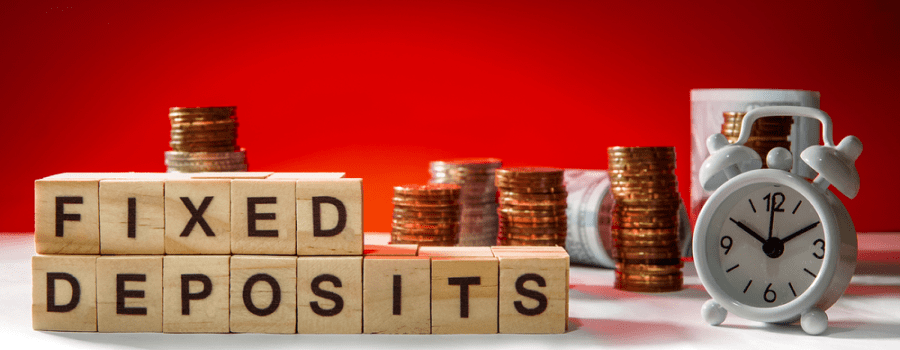02-08-2022 |
A fixed deposit investment is one of India's oldest and most popular investment options. It is a type of financial product offered by banks and non-banking financial institutions to investors who want to make assured money in a reasonably low risk way. It is a financial instrument that works along the lines of a savings account but with one that helps accumulate interest on the money saved in it. This is why it is also known as a fixed deposit account.
Read on to learn more about the fixed deposit meaning and other crucial fixed deposit information.
What is a Fixed Deposit, and How Does it Work?
As mentioned earlier, a fixed deposit is a financial instrument account offered by financial institutions to investors looking for guaranteed1 interest and returns on their invested money. The way FD benefits work is simple. You go to the bank and request to open a fixed deposit account. The bank will show you the fixed deposit interest rates applicable for the financial year beforehand.
After checking the fixed deposit interest rates, you have to choose the term you want for your fixed deposit account. You have to make a one-time lump sum deposit. The tenure of a fixed deposit account can range from as low as ten days and high as ten years. Once you finish finalising the tenure, the fixed deposit becomes activated and accumulates the applicable interest over the term.
What are the Fixed Deposit Interest Rates?
Once the fixed deposit starts running, the interest rate remains the same throughout the term as they remain independent from any market fluctuations.
When the tenure of the fixed deposit ends, you can receive the accumulated payout as a one-time maturity payout or in periodic instalments. However, you cannot withdraw any money from a fixed deposit once it starts and before it reaches maturity. The invested money remains locked for the entire tenure.
If, in any case, you make a premature withdrawal, you might have to clear a penalty levied by the bank. Or you might get the accumulated amount at lower interest rates.
What are the Types of Fixed Deposits?
Once you know the fixed deposit meaning, you can move on to understand the various types of fixed deposits. They include:
- Standard fixed deposits
A standard fixed deposit is the most popular type of fixed deposit. It is when an investor chooses the timeframe for the fixed deposit investment with the predetermined interest rate. The investor can choose between the tenure of 7 days to even ten years.
- Floating fixed deposits
A floating fixed deposit is one in which the interest rate changes every quarter (three months) or year. So, the investor can benefit from an increased interest rate at best or get a lowered interest rate at worst.
- Tax*-saving fixed deposits
A tax*-saving fixed deposit is also like a standard fixed deposit, except that if you want to save tax* from the FD benefits earned, it has to last up to 5 years.
What are the Fixed Deposit Benefits?
Here are the fixed deposit benefits:
- Guaranteed1 returns
What makes fixed deposits a popular investment choice among investors is that they provide assured returns without much risk involved. You get what you desire, and there is no impact of the volatility in capital market on your investment. So, you stay safe from fluctuations in the equity or debt market. However, because the returns are guaranteed1, and the risk is very less.
- Complete transparency
Apart from floating fixed deposits, the fixed deposit rates are consistent. You get what you see, and there are no hidden charges. Moreover, you get the flexibility of choosing the tenure of the fixed deposit and how you want to receive the money once it ends. Opening a fixed deposit account is also very easy and convenient – the entire process takes a few minutes.
- Loan benefits
This is one of the most beneficial fixed deposit features. You can take a secured loan against a fixed deposit in exchange for pledging the amount the deposit will yield at the end of its term.
- Tax FD benefits
Fixed deposits are taxable. The amount earned in maturity at the end of the fixed deposit is subject to tax* deduction at source (TDS) only if the interest earned is more than ₹10,000 in a year.
To Conclude
Fixed deposits are the ideal investment for risk-averse and traditional investors who want the security of guaranteed1 returns. The returns earned on fixed deposits are definitely more than a simple savings account where money remains idle and loses value over time. You can use an FD calculator to calculate this sum.
A fixed deposit can help you fulfil goals like marriage, higher education, travel, and others while ensuring your money does not stagnate due to inflation. However, if you want interest rates and additional benefits like life insurance, savings, and market-linked wealth creation, many other investment options apart from fixed deposits are available. To get insight on what investment avenue aligns with your financial goals, you can explore the Tata AIA life insurance company. You can also choose a life insurance savings plan that will offer life insurance coverage and savings components under a single policy.
L&C/Advt/2022/Jul/1759







 FOR EXISTING POLICY
FOR EXISTING POLICY 
 FOR NEW POLICY
FOR NEW POLICY 




